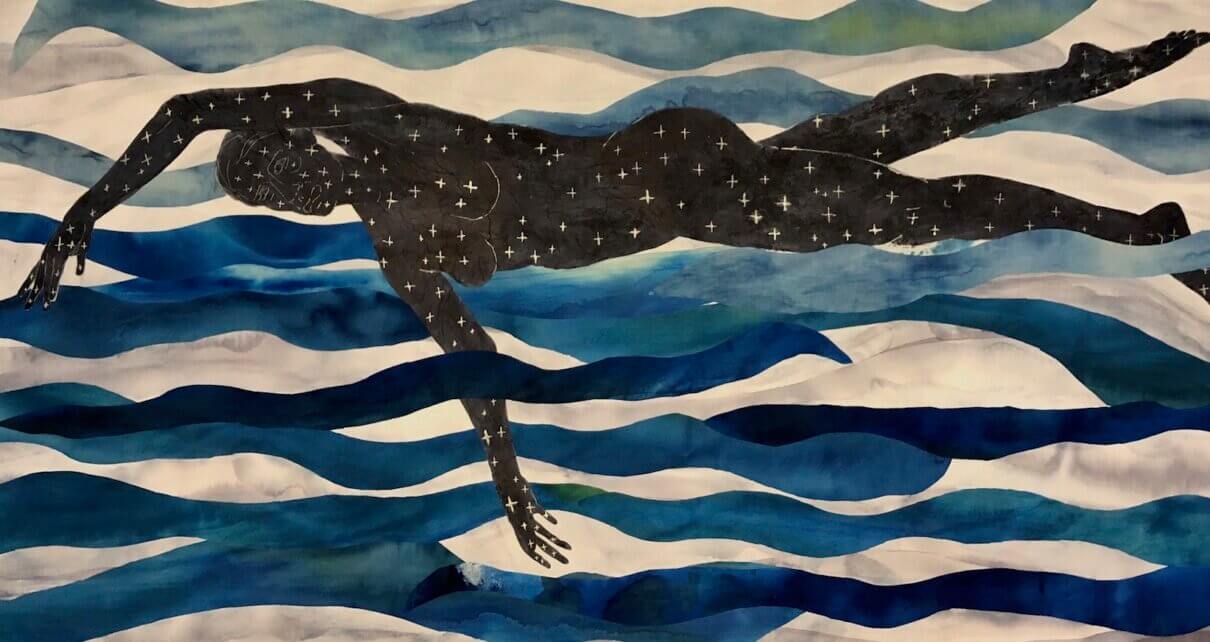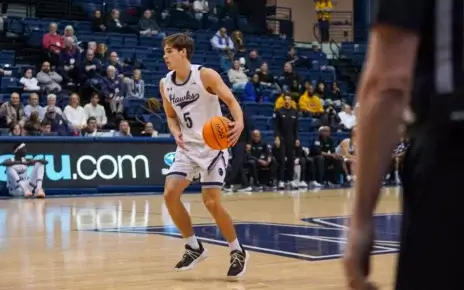ArtNOW hosted its first artist talk of the spring semester, featuring the work of Kimberly Callas, Associate Professor of Art and Design, who completed a two-year fellowship as an artist-in-residence for the Urban Coast Institute (UCI). The event, which took place on Monday, Feb. 6, was hosted in collaboration with the fourth annual Climate Crisis Teach-In.
Callas is a multimedia artist, sculptor, and the lead artist of the social practice project Discovering the Ecological Self. Her work has been exhibited internationally in various galleries and museums, and she has received national and international grants and awards, including a Pollination Project Grant, a first-place award in Sculpture at the Catharine Lorillard Wolfe Art Club’s Annual Exhibit in New York City, and various exhibits in South Korea, New York City, Hungary, and Florida.
During her fellowship, Callas created a series of large-scale drawings inspired by historical nautical charts using graphite, dye, ink, and muslin mounted on canvases. Her work portrays Right Whales’ annual migration through the Jersey Shore and how it is being affected by climate change. More broadly, she noted that this series, and much of her work outside of this fellowship, deals with discovering the “ecological self” and developing intimate relationships with nature.
“The Climate Crisis Teach-In is an iterative event here at Monmouth designed to raise awareness of the climate crisis, both its impacts and solutions, with the goal of inspiring action. Given that science is really good for suggesting solutions but not really good for helping us choose between various solutions, I am delighted to collaborate with ArtNOW,” said Catherine Duckett, Ph.D., Associate Dean of the School of Science, in an opening remark to introduce the event.
“ArtNOW is a performance, art, and technology visiting artist series that seeks to transcend traditional disciplinary boundaries and embrace provocative works that challenge what we know and what we think we know about art,” explained Dickie Cox, MFA, Associate Professor of Communication. “It fosters experiential conversations and art making between contemporary artists who are working in emergent creative practices and the students and faculty within our own academic community.”
Each piece in Callas’ series is marked by latitude and longitude lines and depth charts to convey underlying themes about species migration due to climate change and warming oceans. Her ArtNOW presentation highlighted the works Whale Boat, Woman in Whale, Trace Whale, Night Swimmer, and Tree Boat, all of which are characterized by the symbols of whales, fish, boats, nets, and horizon lines.
“My goal is to build up symbolic conscience and meaning making ability so we can understand what science is telling us about our rapidly changing world,” explained Callas.
She described immersing herself in the research taking place through the UCI, attending several conferences and even going out on the University’s research vessel to visit some of the research sites.
“You really understand ‘urban’ coast,” said Callas, noting the city skyline visible on the horizon when she was on the boat. “I felt like I couldn’t see anything. I was struck by how much I couldn’t see and how much I couldn’t know. I felt blind to everything going on below me. I could feel a great vastness, and I could feel the unknown. I knew this feeling would be important for the work and what I wanted to communicate.”
“It was so interesting to see how much time and energy she put into all of her pieces that she discussed.
She did so much research and had so much passion as an artist,” said Kacie Horowitz, a graduate student studying communication who attended the event.
The Monmouth fellowship was not Callas’ first art and science collaboration. “We have the science, what we need now is the will. We need ways to relate emotionally to the science,” she said. “How can we connect facts and feelings regarding nature?”
“The Climate Crisis Teach-In is really delighted to have art, poetry, and other contributors to the teach-in that can help us decide what we value and what we might want to be choosing in terms of climate solutions,” added Duckett about the importance of collaboration between artists and scientists.
“What caught my attention was how important art can be through a variety of perspectives that I never acknowledged before. Art isn’t only a creative outlet that benefits one emotionally and intellectually, but it also brings insight to social issues occurring throughout our world without the use of words… impacting masses of people, bringing others together, and creating a new meaningful way to advocate for those who might not be able to advocate for themselves,” said Morgan Alston, a senior studying communication with a concentration in media studies and production.
Callas intends to expand upon her work by creating textured figures that represent the human body as a map, both physically and metaphorically. The Night Sea Journey will appear as an exhibit at Monmouth University in January of 2025.
The Climate Crisis Teach-In will continue to host events throughout the spring semester and is continually adding speakers and presentations. Continuing the 2022-2023 season theme of Restorative Relationships During Precarious Times, ArtNOW will host its next artist talk on March 7 and 8 with feminist theatre and performance studies scholar Tessa Carr.




